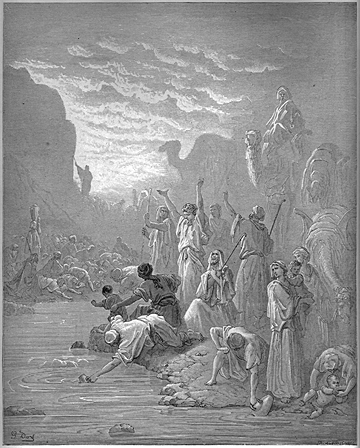Exodus 17
1 Gbogbo ìjọ ènìyàn Israẹli si gbéra láti jáde kúrò láti aginjù Sini wọ́n ń lọ láti ibi kan de ibi kan gẹ́gẹ́ bí Olúwa ti pàṣẹ. Wọ́n pàgọ́ sí Refidimu, ṣùgbọ́n kò sí omi fún àwọn ènìyàn láti mú.
All the congregation of the children of Israel traveled from the wilderness of Sin, starting according to the LORD’s commandment, and encamped in Rephidim; but there was no water for the people to drink.
2 Àwọn ènìyàn sì sọ̀ fún Mose, wọ́n wí pé, “Fún wa ni omi mu.” Mose dá wọn lóhùn wí pé, “Èéṣe ti ẹ̀yin fi ń bá mi jà? Èéṣe ti ẹ̀yin fi ń dán Olúwa wò?”
Therefore the people quarreled with Moses, and said, “Give us water to drink.” Moses said to them, “Why do you quarrel with me? Why do you test the LORD?”
3 Ṣùgbọ́n òǹgbẹ ń gbẹ àwọn ènìyàn, wọ́n sì ń kùn sí Mose, wọ́n wí pé, “Èéṣe tí ìwọ fi mú wa jáde kúrò ní Ejibiti láti mú kí òǹgbẹ pa àwa, àwọn ọmọ wa àti ohun ọ̀sìn wa ku fún òǹgbẹ.”
The people were thirsty for water there; so the people murmured against Moses, and said, “Why have you brought us up out of Egypt, to kill us, our children, and our livestock with thirst?”
4 Nígbà náà ni Mose gbé ohùn rẹ̀ sókè sí Olúwa pé, “Kí ni kí èmi kí ó ṣe fún àwọn ènìyàn yìí? Wọ́n múra tan láti sọ mi ni òkúta.”
Moses cried to the LORD, saying, “What shall I do with these people? They are almost ready to stone me.”
5 Olúwa sì dá Mose lóhùn pé, “Máa lọ síwájú àwọn ènìyàn, mú nínú àwọn àgbàgbà Israẹli pẹ̀lú rẹ, mú ọ̀pá tí ìwọ fi lu odò Naili lọ́wọ́ kí ó sì máa lọ.
The LORD said to Moses, “Walk on before the people, and take the elders of Israel with you, and take the rod in your hand with which you struck the Nile, and go.
6 Èmi yóò dúró ni ibẹ̀ dè ọ ni orí àpáta ni Horebu. Ìwọ ó sì lu àpáta, omi yóò sì jáde nínú rẹ̀ fún àwọn ènìyàn láti mu.” Mose sì ṣe bẹ́ẹ̀ ni iwájú àwọn àgbàgbà Israẹli.
Behold, I will stand before you there on the rock in Horeb. You shall strike the rock, and water will come out of it, that the people may drink.” Moses did so in the sight of the elders of Israel.
7 Ó sì sọ orúkọ ibẹ̀ ni Massa àti Meriba, nítorí àwọn ọmọ Israẹli sọ̀, wọ́n sì dán Olúwa wò, wọ́n wí pé, “Ǹjẹ́ Olúwa ń bẹ láàrín wa tàbí kò sí?”
He called the name of the place Massah, and Meribah, because the children of Israel quarreled, and because they tested the LORD, saying, “Is the LORD among us, or not?”
8 Àwọn ara Amaleki jáde, wọ́n sì dìde ogun sí àwọn ọmọ Israẹli ni Refidimu.
Then Amalek came and fought with Israel in Rephidim.
9 Mose sì sọ fún Joṣua pé, “Yàn lára àwọn ọkùnrin fún wa, kí wọn ó sì jáde lọ bá àwọn ará Amaleki jà. Ní ọ̀la, èmi yóò dúró ni orí òkè pẹ̀lú ọ̀pá Ọlọ́run ní ọwọ́ mi.”
Moses said to Joshua, “Choose men for us, and go out to fight with Amalek. Tomorrow I will stand on the top of the hill with God’s rod in my hand.”
10 Joṣua ṣe bí Mose ti wí fún un, ó sì bá àwọn ará Amaleki jagun; nígbà tí Mose, Aaroni àti Huri lọ sí orí òkè náà.
So Joshua did as Moses had told him, and fought with Amalek; and Moses, Aaron, and Hur went up to the top of the hill.
11 Níwọ́n ìgbà tí Mose bá gbé apá rẹ̀ sókè, Israẹli n borí ṣùgbọ́n nígbà tí ó bá sì rẹ apá rẹ̀ sílẹ̀, Amaleki a sì borí.
When Moses held up his hand, Israel prevailed. When he let down his hand, Amalek prevailed.
12 Ṣùgbọ́n apá ń ro Mose, wọ́n mú òkúta, wọ́n sì fi sí abẹ́ rẹ̀, ó sì jókòó lé òkúta náà; Aaroni àti Huri sì mu ní apá rẹ̀, ọ̀kan ní apá ọ̀tún àti èkejì ni apá òsì; apá rẹ̀ méjèèjì sì dúró gangan títí di ìgbà ti oòrùn wọ.
But Moses’ hands were heavy; so they took a stone, and put it under him, and he sat on it. Aaron and Hur held up his hands, the one on the one side, and the other on the other side. His hands were steady until sunset.
13 Joṣua sì fi ojú idà ṣẹ́gun àwọn ará Amaleki.
Joshua defeated Amalek and his people with the edge of the sword.
14 Olúwa sì sọ fun Mose pé. “Kọ èyí sì inú ìwé fún ìrántí, kí o sì sọ fún Joṣua pẹ̀lú; nítorí èmi yóò pa ìrántí Amaleki run pátápátá kúrò lábẹ́ ọ̀run.”
The LORD said to Moses, “Write this for a memorial in a book, and rehearse it in the ears of Joshua: that I will utterly blot out the memory of Amalek from under the sky.”
15 Mose sì tẹ́ pẹpẹ kan, ó sì sọ orúkọ pẹpẹ náà ní Olúwa ni Àsíá mi.
Moses built an altar, and called its name “The LORD our Banner”.
16 Ó wí pé, “A gbé ọwọ́ sókè sí ìtẹ́ Olúwa. Olúwa yóò bá Amaleki jagun láti ìran dé ìran.”
He said, “The LORD has sworn: ‘The LORD will have war with Amalek from generation to generation.’”





















